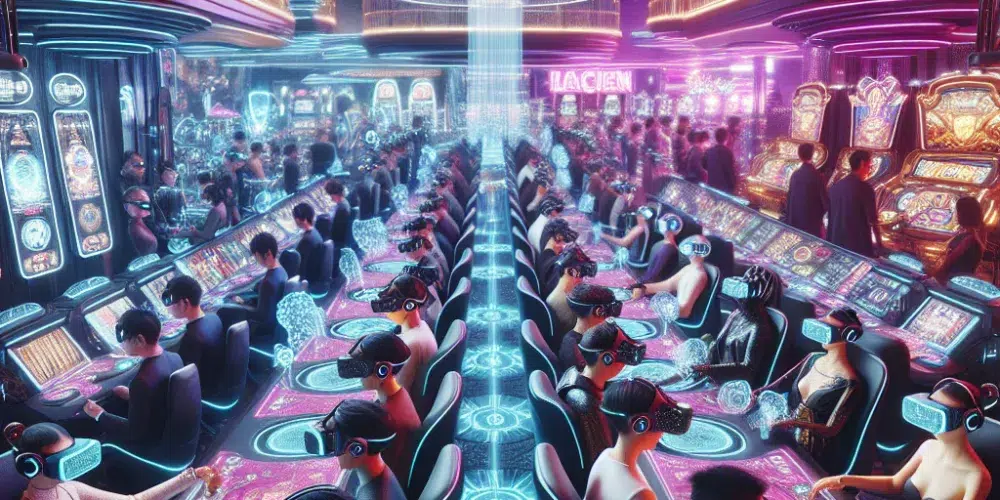Virtual Reality (VR) has long been the subject of science fiction and futurist predictions, but as we step into 2024, it has become a palpable and thrilling reality in the casino industry. With the latest advancements, VR casinos are promising to revolutionize the way players experience games, offering an immersion that bridges the gap between traditional brick-and-mortar casinos and online platforms. This article delves into how VR technology is reshaping the gaming floor, enhancing user engagement, and setting the stage for a new era in gambling.
The Evolution of Virtual Reality in Gaming
The journey of VR in the gaming industry began with simple simulations and has evolved into complex, immersive environments that mimic real-world casinos. Leading tech developers and casino operators have joined forces to craft experiences that are not only visually extraordinary but also rich in interactivity. Players can now choose their avatar, interact with other players in real-time, and navigate through a virtual casino floor with the freedom that mirrors physical movement, all from the comfort of their home.
The Mechanics of VR Casinos
At the core of VR casinos is technology that includes VR headsets, motion capture, and spatial audio. The gear, primarily the VR headset, transports players into a meticulously designed 3D casino. Each game, whether it’s blackjack, roulette, or slots, is rendered with detailed graphics that rival their real-life counterparts.
The real magic, however, lies in the interaction. Players can handle chips, pull slot machine handles, and feel the texture of cards, all facilitated by haptic feedback technology. This multisensory approach not only enhances the realism of the games but also significantly affects player strategies and experiences.
Player Engagement and Behavioral Insights
One of the most significant benefits of VR casinos is the heightened level of player engagement. The immersive nature of VR encourages longer play sessions and deeper involvement in the game, which is a major shift from the more passive interactions seen in traditional online gaming platforms.
Furthermore, VR allows operators to gather more nuanced data about player behavior. Movement tracking and interaction mapping provide insights into player preferences and habits, which can be used to tailor marketing strategies and game offerings more effectively.
The Social Dimension of VR Gaming
VR also reintroduces the social element that is often lost in online gambling. Players in a VR casino can interact with each other through voice or chat, share tips, celebrate wins, or even observe others’ gameplay. This not only replicates the social atmosphere of a real casino but also builds a community among players, enhancing customer loyalty and satisfaction.
Potential Challenges and Ethical Considerations
Despite the exciting developments, VR casinos face several challenges. The high cost of VR equipment and the need for a robust technical setup at home might limit accessibility for some users. Additionally, concerns about addiction and the potential for players to lose track of time and expenditure in such an engaging environment are topics that operators and regulators are carefully examining.
Operators must also navigate the ethical implications of using immersive advertising within these platforms, ensuring that promotions and offers are presented responsibly.
Key Takeaways
– Technological Innovation: VR technology transforms traditional gaming dynamics through immersive and interactive environments.
– Enhanced Player Experience: Detailed graphics and tactile feedback increase the realism of games, improving player satisfaction.
– Data-Driven Insights: Advanced tracking in VR casinos offers operators valuable data to optimize user experience and marketing strategies.
– Social Interaction: VR gaming revives the social interaction that online platforms often lack, fostering community and engagement.
– Accessibility and Ethics: High equipment costs and ethical considerations pose challenges that need to be addressed for broader adoption.
FAQs
Q: What equipment is needed to access a VR casino?
A: Players need a VR headset, such as Oculus Rift or HTC Vive, and potentially additional gear for motion tracking and tactile feedback.
Q: Are VR casinos legal?
A: Yes, VR casinos are subject to the same regulatory frameworks as other forms of online gambling, although specific regulations can vary by jurisdiction.
Q: Can you win real money in a VR casino?
A: Yes, similar to online casinos, players can bet and win real money in VR casinos. However, there are also options for using virtual currency for those who prefer not to gamble with real money.
Q: What is the future of VR in gambling?
A: The future is likely to witness more advanced integrations of VR, with better accessibility, enhanced social features, and perhaps even AI-driven customer service within the VR environment.
As tech enthusiasts and casino aficionados alike keep a keen eye on developments, 2024 might just be the year when VR casinos become a mainstream choice for gamblers around the world, blending the thrill of gambling with the cutting-edge technology of virtual reality.

David Harrison stands tall in gambling journalism, marrying his firsthand casino experiences with a deep understanding of betting psychology. His articles transform complex gambling jargon into engaging tales of strategy and chance, making the world of betting accessible and enjoyable. David’s knack for narrative extends beyond print, making him a sought-after speaker on gambling trends and future bets. In the realm of gambling, David is both a scholar and a storyteller, captivating readers and listeners alike.


